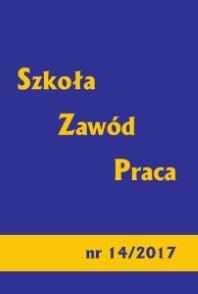Architektoniczna przestrzeń edukacyjna w wymiarze nowych technologii informacyjno-komunikacyjnych
DOI:
https://doi.org/10.34767/SZP.2017.02.01Keywords:
architectural space of education, ITC in education, new schoolAbstract
Today, we can often hear the opinion that we live in the information society. Therefore it can be assumed that the architectural space of education should be redefined. This is due to the diversity and social significance of the phenomena occurring in the context of civilizational changes of the information society. The analysis of these phenomena leads to conclusions pointing to the dysfunctionality of the current educational solutions. For this reason, the need to break with the current practice of school architecture, which is limited only to creating some education-friendly physical space, becomes the imperative.
References
deKerckhove D., Inteligencja otwarta. Narodziny społeczeństwa sieciowego, Mikom, Warszawa 2001.
deKerckhove D., Powłoka kultury. Odkrycie nowej elektronicznej rzeczywistości, Mikom, Warszawa 2001.
Dryden G., Voss J., Rewolucja w uczeniu, Wyd. Zysk i S-ka, Poznań 2003.
Glasersfeld E. von, Constructivism as a scientific method, Pergamon Press, Oxford, 1987.
Innis A., Changing Concepts of Time, Toronto University Press, 1952.
Kruszewski K., Zmiana i wiadomość. Perspektywa dydaktyki ogólnej, PWN, Rzeszów 1987.
McLuhan M., Understanding Media: The Extensions of Man, MacGraw-Hill 1964. (Zrozumieć media: Przedłużenia człowieka, WNT, Warszawa 2004).
Pachociński R., Technologia a oświata, IBE, Warszawa 2002.
Postman N., Technopoly. The surrender of culture to technology, Knopf, New York 1992.
Postman N., The end of education. Redefining the value of school, Knopf, New York 1995.
Resnick L., Towards a cognitive theory of instruction, [w:] S.G. Paris, G.M. Olson, H.H. Stevenson (red.), Learning and motivation in the classroom, Hollsdale, New Jersey 1983.
Saunders W., The constructivist perspective: Implications and teaching strategies for science. “School Science and Mathematics”, vol. 92, 1992, nr 3.
Siemieniecki B., Pedagogika kognitywna. Studium teoretyczne, Wyd. Impuls, Kraków 2013.
Tuczyński K., Efektywność wykorzystywania elektronicznego systemu zarządzania szkołą – sprawozdanie z badań, „Edukacja-Technika-Informatyka”, nr 1(15), Wyd. UR, Rzeszów 2016.
Walat W., Edukacyjne zastosowania hipermediów, Wyd. UR, Rzeszów 2007.
Walat W., Od zastosowań komputera w edukacji do edukacji medialnej, Przegląd idei i koncepcji edukacji wspomaganej komputerowo, [w:] E. Asmakovets, M. Babiarz, S. Koziej (red.), Człowiek, rozwój, kształcenie, Wyd. Uniwersytetu Jana Kochanowskiego, Kielce 2016.
Warchoł T., Badanie możliwości edukacyjnych rozszerzonej rzeczywistości – sprawozdanie z badań, „Edukacja-Technika-Informatyka”, nr 1(15), Wyd. UR, Rzeszów 2016.
Wenta K., Samouctwo informacyjne młodych nauczycieli akademickich, Wyd. Adam Marszałek, Toruń 2003.
Wheatley G.H., Constructivist perspectives on science and mathematics learning, “Science Education”, vol. 75, 1991, nr 1.

